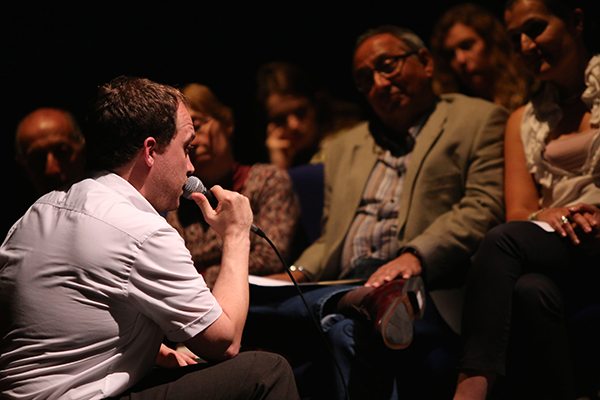

There are two major psychological forces at play in Chris Thorpe and Rachel Chavkin's theater cum performance art piece Confirmation, which took place at the Invisible Dog Art Center in Boerum Hill as a part of New York City’s annual Coil Festival, an international, experimental performance festival presented by Performance Space 122.
The first, a fairly basic Social Psych term from which the play derives its name, is confirmation bias, the principle that we are programmed to, both consciously and subconsciously, see the world in a way that supports or confirms the beliefs we already hold. As Thorpe points to in his play, this bias makes us believe that we are more correct, or have a fuller picture of the world, than we really do.
The other psychological force, or perhaps mystery, isn’t named or mentioned directly in the play. Thorpe touches on it in an interview, saying that part of his reasoning behind developing the piece was to “make my own liberalism less lazy.” Though Rachel Chavkin directed and helped develop the piece, it is driven by Chris Thorpe, a British writer and performer who is a white liberal (he acknowledges this with a pat on his head). Confirmation bias makes us lazy, because it allows us to live self-assured, confident that we are correct in our beliefs, so Thorpe sets out to temper that by engaging in over eight months of conversations with a man with certain similarities to Thorpe - British, white, and educated - but radically differing politics. The man, referred to as "Glen" in the play, runs a popular white supremacist blog and is a self-professed Nazi and a Holocaust denier.
So therein lies the rub. We understand that confirmation bias leads us to strengthen the beliefs that we hold, which, to stick with the theme of this piece, would be a tendency toward liberal or conservative thinking. But do these beliefs stem from a place that makes them susceptible to change through mere dialogue? Furthermore, especially when it comes to major social and political issues - racism, immigration, abortion - confirmation bias or no, we as individuals believe in the inherent truth and justice of our position. So has Thorpe set out boldly to do what may in fact be the impossible?
As I watched Thorpe dash about the stage, flanked on all four sides by modestly sized bleachers, I found myself wondering: why expend so much energy to try to think like a borderline militant, Holocaust-denying white supremacist? Why give him a mouthpiece at all? What’s the point of all this? Perhaps, that is, to pardon the wordplay, beside the point. This is after all, an intellectual exercise, and without a doubt, it makes you think, if about nothing else than the endlessly curious mechanism that is the human brain.
Thorpe is a witty, dynamic performer who embodies both himself and Glen in the piece and has a knack for making people feel both engaged and at ease. He moved around the performance space before the show started, smiling and welcoming audience members, which is apparently a signature move of his - he repeats the same ritual after his shows in case anyone wants to chat with him about the piece. Thorpe involved the audience throughout the piece as well, rewarding responses to questions with tootsie pops and passing out lyrics sheets to Minor Threat's "Guilty Of Being White" as it blasts over the speakers. A more disturbing form of engagement came when Thorpe held index cards in front of audience members sitting in the first row and asked them to read questions he asked Glen. In turn, he would pull up his chair in front of the audience member and respond, while staring into his or her eyes, as Glen.
This Q&A portion of the piece is conducted respectfully and quietly, and at times it’s possible to get lost and forget whether we are hearing Glen or Chris. This portion is the eye of the storm amidst frenetic movement, with Thorpe leaping on chairs, moving from microphone to unmic-ed vocal amplification, and changing clothes from casual black converse to working clothes.
Thorpe acknowledges some, but not all of the latent privileges that allow him access to this project—he is not a woman, queer, or a person of color. Glen gave him the time of day. But we are not unbiased. I can say with reasonable certainty that the audience was at least 90% liberal, and at least 75% white. And in the end, Thorpe seems to reach the conclusion that we really can't change each other's minds on the big issues, but offers the audience a striking, poetic image of exchange: “We will pull out each other’s eyes… we will swap the eyes from hand to hand… my mind, your eyes, my eyes, your mind.” Surmounting confirmation bias suddenly becomes a violent act of self-mutilation.
And yet, as humans we are interminably laced with the capacity for empathy, and we must try, even when it is that difficult, to put ourselves in the position of those who think differently than we do. This is a message that feels particularly prescient to an audience of Americans about to undergo one of the most exhausting ordeals of all -- election season. Can we open our minds to across the aisle rhetoric, or will we emerge from the other side, whether vindicated or not, confirmed?